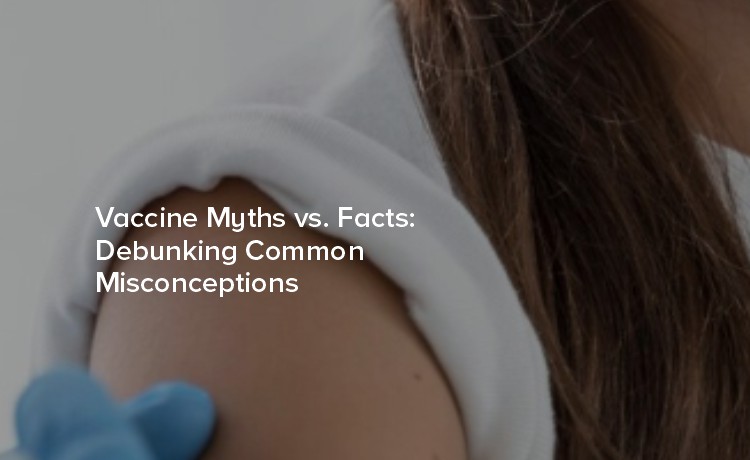
Vaccines are one of the greatest achievements in modern medicine, responsible for eradicating diseases such as smallpox and significantly reducing illnesses like polio and measles. Yet, despite overwhelming evidence supporting their safety and effectiveness, myths and misconceptions continue to spread. These myths fuel vaccine hesitancy, leaving many vulnerable to preventable diseases.
Misinformation about vaccines often spreads like wildfire due to factors such as:
Myth #1: Vaccines Cause Autism
The Myth
This persistent myth stems from a 1998 study by Andrew Wakefield, which falsely linked the measles, mumps, and rubella (MMR) vaccine to autism.
The Fact
The Wakefield study has been thoroughly discredited and retracted by the journal that published it. Numerous large-scale studies involving hundreds of thousands of children have found no link between vaccines and autism. Organizations such as the CDC, WHO, and American Academy of Pediatrics unanimously agree that vaccines do not cause autism.
Myth #2: Natural Immunity Is Better Than Vaccine-Induced Immunity
The Myth
Some believe that contracting and recovering from an illness provides stronger and longer-lasting immunity than a vaccine.
The Fact
While natural immunity can occur, it comes at a high cost. Contracting diseases like measles, chickenpox, or COVID-19 can lead to severe complications, hospitalization, or even death. Vaccines provide immunity without the risks associated with the disease itself. For example, research has shown that the COVID-19 vaccine provides significant protection without exposing individuals to life-threatening symptoms.
Myth #3: Vaccines Contain Harmful Ingredients
The Myth
Claims often suggest that vaccines are loaded with dangerous chemicals like mercury, aluminum, or formaldehyde that can harm the body.
The Fact
Vaccines do contain trace amounts of certain compounds, but these are either naturally present in the human body or used in levels proven to be safe. For instance:
The overwhelming scientific consensus is that these ingredients are used in safe and controlled quantities.
Myth #4: Vaccines Are Rushed and Not Properly Tested
The Myth
With the rapid development of vaccines like those for COVID-19, some people believe the process is hasty and skips safety evaluations.
The Fact
Vaccines undergo rigorous clinical trials in multiple phases before approval. Even COVID-19 vaccines, developed under the urgency of a global pandemic, followed meticulous safety protocols. Efforts were accelerated due to unprecedented global collaboration and existing research on similar viruses, not because safety standards were ignored.
Myth #5: Vaccines Can Alter Your DNA
The Myth
Messenger RNA (mRNA) vaccines, such as Pfizer and Moderna's COVID-19 vaccines, have led to widespread claims that they can alter your DNA.
The Fact
mRNA vaccines do not interact with or change your DNA in any way. These vaccines work by instructing your cells to produce a harmless piece of the virus, prompting your immune system to create a defense. The mRNA never enters the cell's nucleus, where your DNA is stored. Once its job is done, the body breaks it down and eliminates it.
Myth #6: Vaccines Are Only for Kids
The Myth
Some people believe vaccines are primarily for children and that adults do not need them.
The Fact
While childhood vaccinations are crucial, adults also need vaccines to stay protected. For example:
Adults who travel, have chronic health conditions, or are pregnant might also need specific vaccines.
Myth #7: Vaccines Aren’t Necessary if a Disease is Rare
The Myth
The elimination of diseases like polio and measles in some regions leads people to believe vaccines are no longer necessary.
The Fact
Diseases become rare largely due to widespread vaccination. If vaccination rates drop, those diseases can resurface through outbreaks, as we've seen with measles in unvaccinated communities. Vaccines prevent resurgence, keeping both individuals and communities safe.
Vaccines aren’t just about individual protection; they form the backbone of public health. Through herd immunity, vaccines protect those who can’t be vaccinated, like newborns or individuals with compromised immune systems. By collectively maintaining high vaccination rates, we drastically reduce the risk of outbreaks and protect the most vulnerable in our communities.
Vaccines have eradicated smallpox, nearly eliminated polio, and drastically reduced diseases like tetanus and diphtheria. They’re one of the safest and most effective tools we have for saving lives.
You can be an advocate for vaccine education using these approaches:
Making informed decisions about vaccines can protect not just your health but also the health of your family and community. If you're unsure about vaccine recommendations or have questions, consult a trusted healthcare provider or visit reputable sources for guidance.